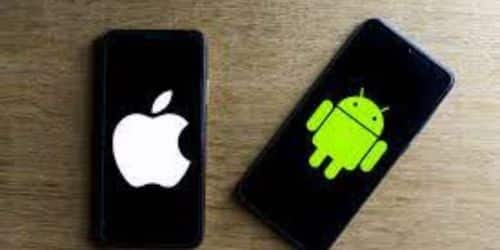We often advise sticking with the same platform that your current phone runs on when purchasing a new phone. Switching at least requires getting used to a new interface’s eccentricities and runs the risk of removing access to previously purchased programs, app-specific data, or even photo and data services. But if you’re thinking about switching, we have some knowledge on the actual differences between iOS and Android, gathered by using smartphones and tablets on both platforms for thousands of hours. In this post, we will be learning the similarities between iPhone vs Android phones in both their security and users.
iPhone vs Android
Google is the developer of Android. On its Pixel phones, it installs its own version with a Pixel flavor, and it allows companies like Samsung, Oppo, Sony, and others to overlay their own skins on top of their particular hardware. The operating system for Apple’s iPhone, iPad, and iPod touch is called iOS. Apple doesn’t have to worry about adapting the code to work with 100 different devices from 12 different manufacturers because it was built concurrently with the hardware.
They are both extremely similar in concept. You can use hundreds of apps to watch movies, communicate with friends, read the news, manage your calendar, and more on both devices. They both let you make calls, send messages, take images, and run hundreds of apps.
They have also borrowed heavily from one another over the years; features that used to set Android apart from the iPhone, such as widgets or notifications, are no longer as important. But there are still some significant differences, which we’ll discuss.
Similarities between iPhone and Android
You may have pondered what it’s like to use an Android smartphone if your primary device is iOS, or an iOS device if your primary device is Android unless you’ve used both operating systems. Most people end up buying one of each because their curiosity wins out. This is the best strategy if you have the resources, to get the best of both worlds.
What Are the Similarities of iPhone vs Android?
You’ll notice as we go along that there aren’t many differences between the two platforms. iOS and Android smartphones used to be highly distinct, but due to competition and other causes, they are becoming more similar in terms of features and utility. Only a few examples of the similarities between iPhone and Android are as follows:
#1. Simple Application Setup
It’s easy to install an app on an iPhone or iPad. By visiting the app store or iTunes on your smartphone, you can complete the task. To install an application, all you need to do is search for it and click the “INSTALL” button. The rest will be handled by the iOS device, and your app will be usable in a matter of seconds.
#2. Touch, and Gestures
They also use extremely similar touch and gesture conventions to operate the device, which is another striking similarity. Smartphones running iOS and Android both have touch screens. Although the design of the home screen may vary, both smartphones have one. To access both devices, you’ll also need to swipe.
#3. Apps in Use
You can only use one app at a time because apps on iOS and Android typically run in full-screen mode. This is not to suggest that multitasking is impossible. Both systems allow for multitasking, albeit the background applications will still be running on both. You can only effectively multitask with the most recent beta releases of Android N and iOS.
#4. Lock Screen
By downloading third-party programs, you may customize the Lock screen on both the Android and iOS operating systems. Both include the option of a lock screen, which users can utilize to avoid unintentional dialing and keep their device dormant while not in use.
Differences Between Android and iPhone
Let’s examine the differences between these two systems.
#1. Closed Systems vs. Open Systems
Android has more open software than iOS does. On an Android smartphone, you can download and install any Android software, even if it isn’t listed in the Google Play store. This is not the case with iOS. Apple for some reason won’t let you watch Flash movies or play Flash games on iOS devices.
#2. Security
Because Apple has such a tight hold on the apps that can be installed on an iOS device, the devices are more secure. On the other hand, because the Android platform is so open, more security threats, including malware, are possible. Therefore, for those looking for a more secure smartphone, iOS devices are a safer substitute.
#3. Control by the User
Apple puts effort into creating a pleasing and well-designed user interface. All iOS devices have beautifully designed products, and Apple does not disappoint. However, Android smartphones offer more versatility when it comes to personalizing how the widgets look. A new Android device can be chosen to change the UI because there are so many different Android devices available.
#4. Life of the Battery
The battery life of Android smartphones, on the other hand, is much less, but there are so many different models that you can choose one with a longer battery life.
iOS cell phones often have longer battery life than Android smartphones. But unlike Android cellphones, the user cannot change the battery.
iPhone vs Android Users
User personas are catered to differently by iOS and Android. Organizations, startups, and enterprises should learn as much as they can about their unique user bases before developing a mobile app in order to fulfill their needs. The main distinctions between iPhone vs Android users are highlighted in this overview, especially with regard to demographics and behavior. It’s challenging to state with certainty whether a particular market segment is more likely to utilize an iPhone or an Android device. These things differ from nation to nation, evolve with time, and depend on a wide range of factors.
Here are some salient conclusions on the differences between Android vs iPhone users based on current publicly accessible global data:
- Because iPhones tend to draw premium or higher-income clients, iPhone users typically earn more than Android users. According to a 2018 survey, the average yearly income for iPhone users was $53,231, whereas it was $37,040 for Android users. The same survey revealed that iPhone users spend more money than Android users do on clothing, cosmetics, and tech-related items.
- Customers are loyal to both platforms, with Android users being marginally more devoted than iOS users. Compared to iOS’s 86%, Android boasts a 91% customer retention rate.
- Justifications for changing from one OS to another – Users transition from iOS to Android and vice versa for a variety of reasons, including better user experiences, greater functionality, and better pricing. Only 30% of people who converted from iOS to Android claimed that the latter offered a superior user experience, compared to 47% of Android users who felt the same about iOS.
- Android users feel less safe than Apple users. It’s challenging to say with certainty that iOS protects user security and privacy better than Android. Although many security professionals agree, they also claim that it is not that straightforward. However, a survey conducted in 2022 discovered that customers feel more secure using Apple devices than Android ones in terms of perceptions. Additionally, 75% of iOS users reported being able to fully recover their data, compared to only 55% of Android users, among those surveyed who experienced security breaches.
- According to 2021 research from Airship, Android users are more receptive to push notifications, and Android apps typically perform better than iOS apps in terms of user engagement from these messages. Android has a reaction rate of 4.6%, compared to iOS’s 3.4%. This indicates that Android users click on push notifications more frequently than iPhone users.
Security of iPhone vs Android
The Android vs. iPhone argument has been going on for a while on the best one to provide with security. Let’s dissect each argument and determine which smartphone operating system wins in each category.
#1. App Marketplace Security
Every program on the Apple program Store is thoroughly examined, which may result in fewer apps being offered but also lessens the likelihood of malware-filled apps and security problems. There are much more apps available on Android’s open Google Play Store than there are on Apple’s App Store, but there is a much larger potential that hackers will gain access to the system and use harmful programs to spread malware.
#2. Device Manufacturers
Because of their integrated designs, Apple gadgets have fewer and more difficult-to-find security flaws. Apple has much more control over how its mobile devices and operating systems interact because they are inseparable. Although iOS devices have fewer functionalities than Android devices, the integrated design of the iPhone makes security flaws much less common and more difficult to detect.
#3. Updates to Patch Vulnerabilities
Apple upgrades promise consistent security and are simpler to manage across devices. Software and security upgrades for Android and iOS are some of the primary ways Apple and Google can keep their devices safe. Updates are simpler to produce and distribute since Apple carefully regulates the devices in its ecosystem. Additionally, it implies that Apple may often maintain iOS devices for longer before discontinuing official support after five years.
#4. Support for Third Party Security Apps
These two OSs support a large selection of security applications, including VPNs. Even if a device’s built-in security measures might be very helpful, it’s also crucial to be able to include third-party services like antivirus software and VPN programs in the operating system.
#5. Operating System Source Code Security
While Android has made the most of its open-source operating system, Apple closely secures its source code. Hackers have a harder time locating security holes because to Apple’s closed source code. The open-source nature of Android might actually mean the exact reverse of that, but it also makes it more easily accessible to a range of app developers, and Google is gradually starting to take advantage of this aspect.
#6. Popularity
Fewer users equal fewer targets, which gives hackers less incentive to create malware for the iPhone. The iPhone is a somewhat less appealing target for hackers because of the lesser number of iOS devices and its enhanced protection. Android is the most popular smartphone operating system in the world, but this has also become one of its weaknesses: more users equals more potential targets for hackers and more motivation to create malware for Android.
What Are the Advantages of an iPhone Over an Android?
Here are seven compelling reasons to switch from Android to iPhone.
- Protection of data.
- The simplicity of use, the Apple ecosystem, and…
- Install the top apps first.
- Family Sharing, Apple Pay,
- iPhone prices continue to rise.
What Are the Disadvantages of iPhone Compared to Android?
The iPhone has drawbacks as well. These include the fact that the battery life of the iPhone is typically worse than that of Android. Lack of a microSD card results in low storage, which is another drawback to purchasing an iPhone. Additionally, iPhones are not customizable and are quite pricey.
Related Posts
- MESSAGING APPS: Best Messaging Apps and How to Choose the Right One for You
- Web Design Salary in 2023
- WHITE HAT HACKERS: Who Are They, Salary, How to Become One.






